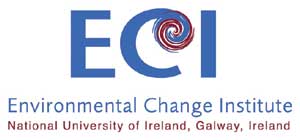| 2006 |

|
YEAR BOOK |
National University of Ireland, Galway
|
New infectious disease initiative at the National University of Ireland, Galway — Microbe-human interactions
|

A new initiative in research on gastrointestinal infections, including food-poisoning bacteria, supported by a €1.2 million EU grant, is being launched at NUI, Galway to study these areas of research which represents a combined initiative of the Human Pathogen Cluster in the Department of Microbiology and the Environmental Change Institute (ECI) at NUI, Galway.

The project will use novel integrated molecular and mathematical approaches to understand how bacteria infect cells and the resulting changes leading to disease. A further aspect of the project is how environmental changes and stresses influence bacterial pathogens. The initiative aims at building and furthering world-class research capability at the university in this area by the integration of advanced molecular technologies for the study of bacterial-cell interactions.
"In many national and international research groups the focus is on either the bacterium or the host. However, this is like examining only one side of a coin – not the whole coin" observes Professor Moran, coordinator of the research project. The NUIG project will use a more global approach.
The novel approach will combine analysis of the DNA and biomolecules produced by the various bacteria, using advanced genome analysis and proteomics, but supplement this with examination of the effects of the bacterial molecules on human cells and their responses. One aspect of the research strategy is to study molecular cell signalling events (in both pathogen and human host) using techniques for studying host cells (transfection and siRNA techniques) as well as biochemical techniques for the study of protein-protein interactions and post translational modifications. Other aspects of the research work will also focus on the application of the post-genomic technologies of proteomics and transcriptomics (gene microarray technology) to the study of key GI pathogens.
This biological analysis will be combined with culture studies / mathematical modelling of microbial population dynamics to allow prediction of disease mechanisms. "Overall, this will allow a more global picture of how these bacteria cause disease. With a better picture of how the disease develops, it will aid us in developing and designing better therapeutic agents and vaccines against these bugs".
Researchers will be located within the Microbiology Department and be associated with the reasearch groups of Dr. Aoife Boyd, Dr Cyril Carroll, Dr. Gerard Fleming, Dr. Conor O'Byrne and Prof. Anthony Moran which constitute the Human Pathogen Cluster. The researchers will be supported by facilities in the ECI.
A number of the research groups at NUIG have established international reputations in microbiology, genetic analysis, immunology and cell biology but the initiative will seek to consolidate the research of these individual groups and overcome the fragmentation of research. Furthermore, the incorporation and integrated application of the newer technologies and approaches will bring to a new level the research capability at the university. "By attracting leading, senior international researchers to the University with expertise in these newer technologies and their integration into the active research groups already present, we plan to increase the international impact of our research", says Professor Moran.
Specifically, the research will examine the interactions that take place between the human host and certain bacteria important in human disease. The bacteria include Salmonella, Campylobacter and Listeria – leading causes of food-poisoning - as well as more emergent food-poisoning bacteria, Vibrio and Helico-bacter pylori, which is a cause of peptic ulcers and a cofactor in gastric cancer development. The importance of H. pylori in gastric disease is highlighted by the award of the Nobel Prize in Physiology or Medicine for its discovery last year.
The initiative is funded by a Transfer-of-Knowledge grant from the EU Marie Curie programme.
Contact: Dr Martina Prendergast,
Development Manager, Environmental Change Institute
NUI Galway, IRELAND.
Tel: +353-91-493548 (Office), Fax: +353-91-492515
Web: www.nuigalway.ie/eci